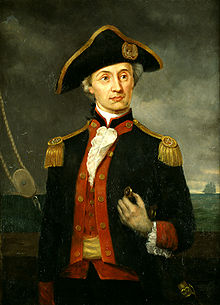John Paul Jones | |
|---|---|
 Portrait c. 1890, based on a work of c. 1781 | |
| Birth name | John Paul |
| Nickname(s) | Father of the American Navy |
| Born | July 6, 1747 Arbigland, Kirkcudbrightshire |
| Died | July 18, 1792 (aged 45) Paris, France |
| Buried | |
| Allegiance | |
| Service | |
| Years of service | 1775–1792 |
| Rank | Captain (Continental Navy) Rear Admiral (Imperial Russian Navy) |
| Battles / wars | |
| Awards | Order of Military Merit Congressional Gold Medal Order of Saint Anna |
| Signature | |
John Paul Jones (born John Paul; July 6, 1747 – July 18, 1792) was a Scottish-born American naval officer who served in the Continental Navy during the American Revolutionary War. Often referred to as the "Father of the American Navy", Jones is regarded by several commentators as one of the greatest naval commanders in the military history of the United States.[1][2][3] Born in Arbigland, Kirkcudbrightshire, Jones became a sailor at the age of thirteen, and served in the British Merchant Navy, including several slave ships. After killing a mutinous subordinate, he fled to the British colony of Virginia to avoid being arrested and in c. 1775 joined the newly established Continental Navy.
During the ensuing war with Great Britain, Jones participated in several naval engagements with the British Royal Navy. Commanding the warship Ranger, Jones conducted a naval campaign in the North Sea, attacking British merchant shipping and other civilian targets. As part of the campaign, he raided the English town of Whitehaven, won the North Channel Naval Duel and fought at the Battle of Flamborough Head, gaining him an international reputation. Left without a command in 1787, Jones joined the Imperial Russian Navy and rose to the rank of rear admiral. However, after he was accused of raping a 10-year-old girl, Katerina Stepanova, he was forced out of the Russian navy and soon died in Paris at the age of 45. A Freemason, Jones made many friends among U.S. political elites, including John Hancock, Thomas Jefferson and Benjamin Franklin.[4][5][6]
- ^ "John Adams I (Frigate) 1799–1867". USA.gov. Retrieved August 22, 2015.
- ^ Delaware County Historical Society (1902). Proceedings of the Delaware County Historical Society.
- ^ "Joshua Humphreys". www.navalengineers.org. Retrieved January 24, 2023.
- ^ United States. Congress. Congressional Record. Proceedings and Debates of the ... Congress. U.S. Government Printing Office. p. A4791. Quote: "Tom Paine, Patrick Henry, James Otis, and John Paul Jones were all Masons."
- ^ Morison, 1959[broken anchor]p. 2232
- ^ Morison, 1959[broken anchor]pp. 120–121